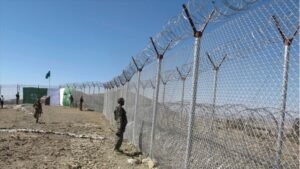Mutual Distrust and Escalating Violence: The Downward Spiral of Afghanistan-Pakistan Relations

The road leads to Khost province, along the Durand Line. Photo by @AADIL for ADN
By Kadeem Baloch
Over the past year, the relationship between Afghanistan and Pakistan has deteriorated significantly, marked by escalating tensions, mutual accusations, and violent confrontations. This downward spiral has not only strained diplomatic ties but also exacerbated regional instability, providing fertile ground for various militant groups to operate with impunity.
In September 2024, hostilities intensified when Afghan Taliban border guards clashed with Pakistan’s Frontier Corps in the Kurram district, adjacent to Afghanistan’s Khost province. The skirmish reportedly erupted over the construction of a security outpost by Taliban forces on their side of the border, which Pakistani troops perceived as a threat, leading them to open fire. The confrontation resulted in injuries to at least five Pakistani soldiers, including an officer, and the deaths of eight Afghan Taliban fighters, among them two commanders. This incident underscored the fragile nature of border relations and the potential for minor disputes to escalate into significant conflicts.
The Afghan de facto government has accused Pakistan of conducting mass expulsions of Afghan refugees, alleging harassment and arrests aimed at forcing their return to Afghanistan. In February 2025, the Afghan embassy in Islamabad reported a surge in detentions of Afghan nationals lacking proper documentation, describing it as a concerted effort to expel all Afghan refugees. Pakistan’s foreign ministry refuted these claims, asserting that the measures were part of an initiative to repatriate illegal foreigners and facilitate the return of Afghans to their homeland. This policy shift has created uncertainty and fear among the Afghan refugee population in Pakistan.
Tehrik-e-Taliban Pakistan (TTP) Operation
Pakistan has expressed growing concern over the presence of Tehrik-e-Taliban Pakistan (TTP) militants operating from Afghan soil. The TTP, responsible for numerous attacks within Pakistan, has found sanctuary across the border, leading Islamabad to accuse Kabul of harboring these militants. In response, Pakistan has conducted cross-border airstrikes targeting alleged TTP hideouts in Afghanistan. Notably, in December 2024, Pakistani airstrikes in Afghanistan’s Paktika province reportedly resulted in significant casualties, including civilians. The Taliban government condemned these strikes as violations of its sovereignty, further straining bilateral relations.
Amid these tensions, reports have emerged suggesting that Pakistan’s military establishment is providing support to the Islamic State Khorasan Province (ISKP) as a strategic move to counterbalance the Afghan Taliban’s alleged support for the TTP. This complex web of alliances and enmities has created an environment where militant groups can exploit the discord between the two nations, leading to an increase in ISKP activities in the region. Such developments have raised alarms about the potential for the region to become a haven for various terrorist entities, posing threats beyond South Asia.
The deteriorating relationship between Afghanistan and Pakistan has far-reaching implications for regional security. The frequent border clashes, cross-border militancy, and support for proxy groups have destabilized the area, making it conducive for terrorist organizations to thrive.
Pakistan’s actions have come under intense scrutiny, with many accusing it of perpetuating the cycle of violence. Despite being a victim of terrorism itself, Pakistan has often been criticized for its dual policy of fighting some militant groups while supporting others. This approach has backfired, as the very groups it once supported have turned against it.
The Pakistani military’s alleged support for ISKP is seen as a desperate attempt to counterbalance the Taliban’s influence. However, this strategy has only worsened the situation, as ISKP’s growing presence threatens both Afghanistan and Pakistan. Experts argue that Pakistan’s short-sighted policies have made it one of the most terror-prone regions in the world, even surpassing Afghanistan in terms of insecurity.
The deteriorating relationship between Pakistan and Afghanistan has far-reaching consequences. The region’s instability provides a safe haven for terrorist organizations, which can plan and execute attacks beyond South Asia.
The international community has expressed concern over the escalating tensions and their potential to exacerbate the humanitarian crisis in Afghanistan. Experts advocate for a reassessment of engagement strategies with Afghanistan, emphasizing the need for constructive dialogue to improve living conditions and stabilize the region. There is a growing consensus that isolation and punitive measures may further entrench militant groups, whereas inclusive policies could foster internal progress and regional cooperation.
The past year has witnessed a significant decline in Afghanistan-Pakistan relations, characterized by mutual distrust, border conflicts, and the proliferation of militant activities. Addressing this complex situation requires a multifaceted approach, including diplomatic engagement, confidence-building measures, and regional cooperation to combat the shared threat of terrorism. Without such efforts, the cycle of violence and recrimination is likely to continue, with profound implications for regional and global security.
The author chooses a pseudonym. Kadeem Baloch is a freelance journalist based in Pakistan.
Note: The contents of the article are of sole responsibility of the author. Afghan Diaspora Network will not be responsible for any inaccurate or incorrect statement in the articles.








